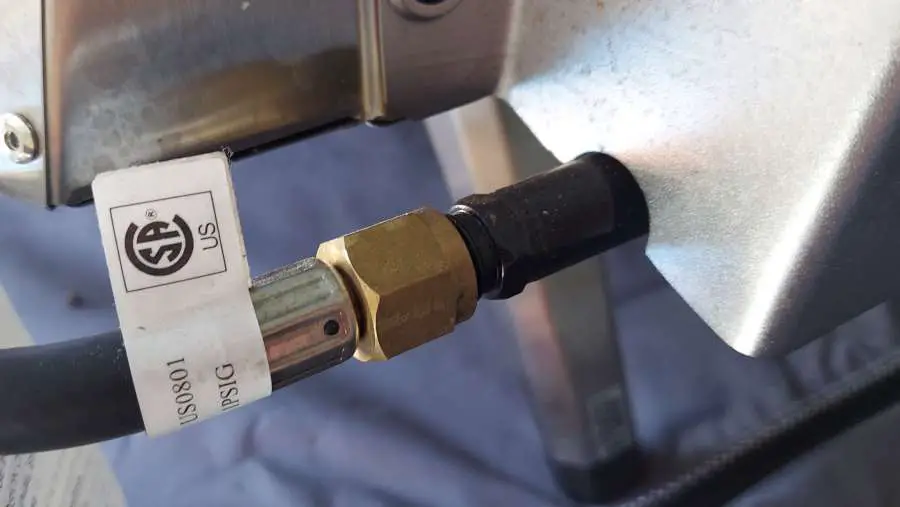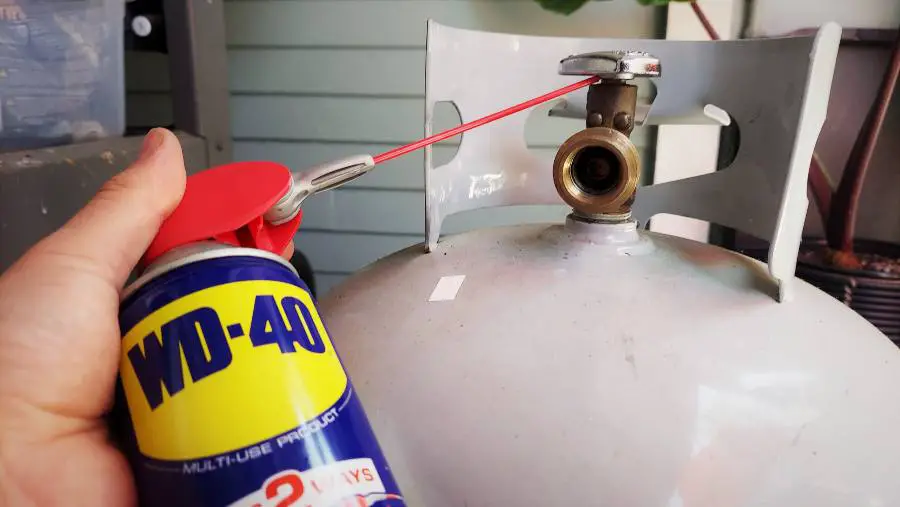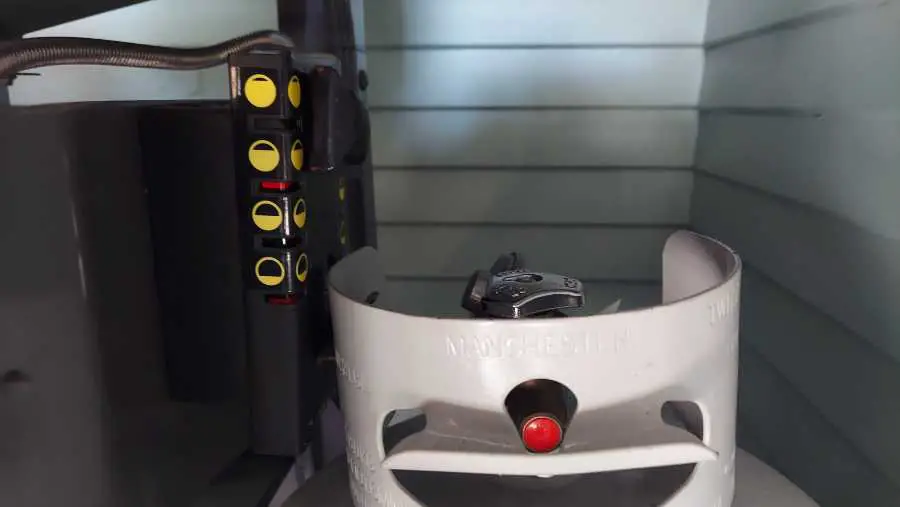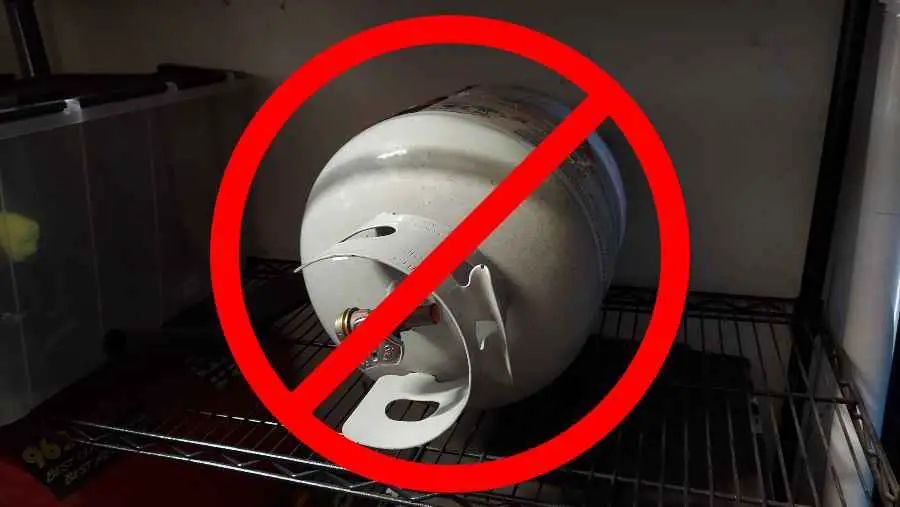Last Updated on May 23, 2024 by Dan Campbell
You might run into a situation where you no longer need a propane tank and do not want to exchange it, but want to completely get rid of it. Whether the tank is partially full or empty, you cannot put them in your regular trash. Propane tanks are considered hazardous waste, so most recycling centers will also not accept them. To dispose of or recycle a 20 lb propane tank, you can take your old propane cylinder and leave it next to a Blue Rhino or Amerigas exchange cage. It’s as simple as that.
Why am I writing this article? Because when I searched this question before I moved and needed to get rid of some extra propane tanks laying around, I was getting a multitude of various answers with most of them saying “get it exchanged” or “refill it”. Well, I don’t want it exchanged, I am trying to get rid of it!
And I was surprised to find out that it can be as easy as leaving it at an exchange cage since most websites stated I had to take it to a hazardous waste material site, which is a lot more effort on my part since there is a Blue Rhino exchange cage near where I live.
Leave Your 20 lb Tank Next To An Exchange Cage
I don’t know why most websites can’t give a straight answer on this, but almost every propane supplier’s website simply states “leave it at our display and we’ll take it”. It’s as simple as that.
Here is what Blue Rhino says about leaving propane tanks at their exchange cages:
If you have a propane tank that you don’t want, place your old tank beside a Blue Rhino display and we’ll take care of the rest. – Blue Rhino
And here is what Amerigas says:
Exchanging your old propane tank for a refilled one is the easiest way to dispose of it, but if you need to get rid of it for good- you can also just drop it off at most propane refill or exchange locations. – Amerigas
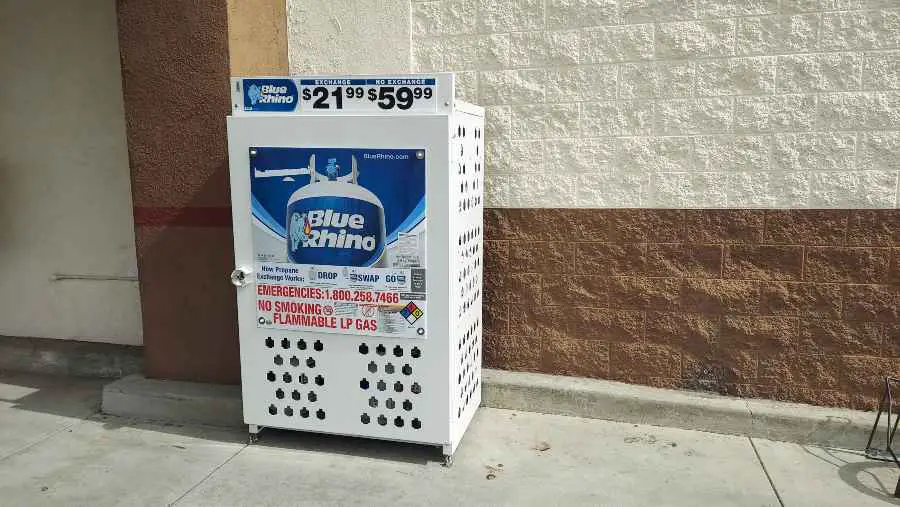
So next time you need to dispose of a 20lb propane tank, just find your nearest Blue Rhino or Amerigas exchange location and leave it next to the cage. Even if your tank is not from these suppliers, they will still recycle the tank for you.
On top of that, when researching this I learned that both Blue Rhino & Amerigas will exchange competitor tanks for a new one too, not just their own, which I thought was pretty cool.
This is great if you have a tank nearing its expiration date and you need a new tank to replace it. However, be aware that both Blue Rhine & Amerigas only fill their propane tanks to 15 lbs of propane, or roughly 20% less than what the legal safety limits allow. Read my article on how many gallons of propane are in a tank to learn more about this, and why they do this.
For larger sizes such as 40 lb and 60 lb tanks, you’ll want to contact the tank manufacturer, a local propane supplier, or your local hazardous waste disposal site.
Hazardous Waste Disposal Sites
Because propane tanks contain flammable gas and can be dangerous to human life and the environment, they are considered hazardous waste materials and cannot be disposed of in your regular trash or taken to standard recycling plants.
You can search online for “hazardous waste disposal” to find your nearest center. Sometimes your city or small local businesses will hold monthly or semi-regular hazardous waste recycling events where you can drop these types of items off. It’s still beneficial to call ahead or look at their website to make sure they will accept propane tanks.
As I mentioned above, while you can drop off your 20 lb propane tanks at a local propane exchange cage, anything larger will need to be disposed of at either a hazardous waste disposal site, or you’ll need to contact the tank manufacturer or a local propane supplier.
For large, whole-home propane tanks, such as 500 gallons tanks, you’ll want to get in contact with your propane supplier.
Disposing of Propane Tanks Larger Than 20lbs
While recycling 20 lb propane tanks is a breeze, disposing of propane tanks larger than that can be more of a hassle. Depending on the size and how it’s serviced, you’ll either want to contact your propane supplier, the manufacturer of the tank, or your local hazardous waste disposal center.
For propane tanks under 100 lbs, you can typically just take them to your local hazardous waste disposal center. Make sure to reach out beforehand to confirm they will accept it and clarify the size of the tank.
For propane tanks larger than 100 lbs, such as 500-gallon tanks, reach out to your current propane supplier about disposing of the tank for you. This will typically come with some fees associated with the preparation and removal of the tanks, however, it may be your only option.
Disposing of Camping Propane Tanks and Smaller Sized Bottles
A lot of the small propane bottles you can buy for camping, such as those little 1lb Coleman propane canisters are single-use only, and cannot be reused. These bottles are not designed to the same specifications as refillable tanks and can be dangerous to refill, and will need to be disposed of after using them.
While you can dispose of 20 lb tanks at an exchange cage, they will not take your camping propane bottles. To dispose of 1 lb camping propane tanks you will need to take it to your local hazardous waste disposal center.
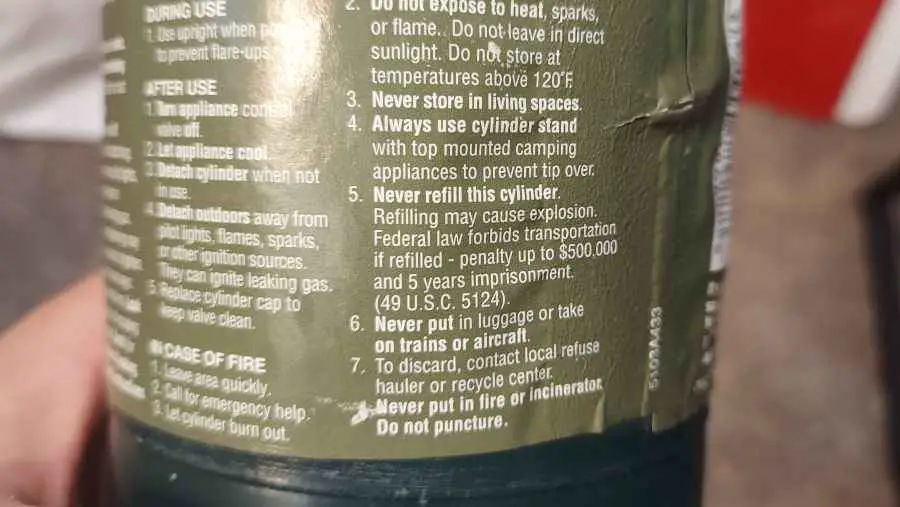
Federal law actually forbids transporting disposable cylinders if refilled, which can carry a penalty of up to a $500,000 fine and 5 years imprisonment (49 U.S.C. 5124).
Transporting Propane Tanks In Your Car
Transporting propane tanks can be dangerous if done incorrectly or without caution. When possible, avoid transporting propane tanks inside the passenger area of a car.
Make sure to follow a few safety tips when transporting propane tanks, even if they’re empty.
Always:
- Always transport propane tanks vertically and make sure they are secured
- Always ensure the valve is fully closed, and nothing is attached to the tank
- Always keep the tank in a well-ventilated space, preferably in the bed of a truck
- If you have to transport the tank in the passenger area of a car, place it in the backseat and secure it with a seatbelt and have your windows rolled down
Never:
- Never leave the tank in a hot car. If it gets too hot it can trigger the pressure relief valve, which will fill your car with propane
- Never transport propane tanks on their side
- Never smoke near propane tanks (see video below)
- Never transport propane tanks in the trunk of a car
Failure to follow these safety tips when transporting can lead to serious injury or even death.
For example, take a look at this video of a news channel reporting an incident where a woman lit a cigarette in her car which caused an explosion. Apparently, they were transporting a propane tank that was connected to a bbq and it was leaking propane into the passenger area.
When Should You Recycle Your Propane Tank
You should recycle your propane tank if it is near its expiration date. While propane tanks do not list the exact date they expire, they list the date they were manufactured. You simply need to add 12 years to this date to figure out when you should recycle your propane tank or have it recertified.
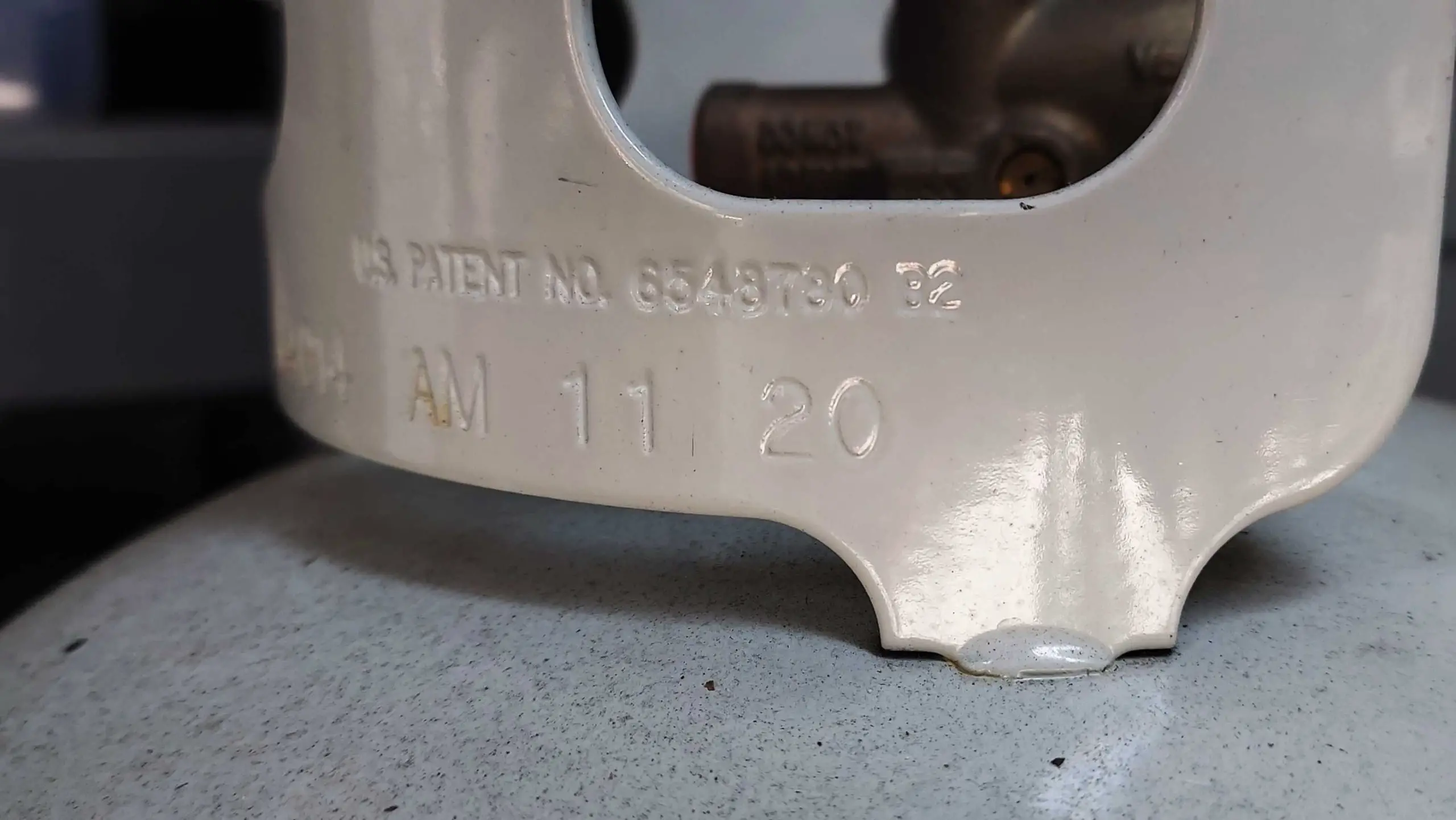
The date will be listed as four numbers, for example, you can see in the picture above of my propane tank the numbers listed are “11 20” meaning the propane tank was manufactured in November of 2020. This means I would need to recycle or have the tank recertified by November of 2032.
The easiest way to recertify a tank is to simply exchange the tank for a new one, as the propane supplier will pick it up and have it recertified for further use, or recycled if they deem it uncertifiable.
Frequently Asked Questions About Disposing of Propane Tanks
Can I throw an empty propane tank in my regular trash?
You should never throw propane tanks away in your house trash or recycling. Always properly dispose of propane tanks by either leaving them at a propane exchange cage where allowed, contacting a local propane supplier, or taking it to a hazardous waste disposal site.
How do I know if my 20 lb propane tank is empty?
There are multiple ways to tell how much propane is left in your propane tank, the easiest way is to pour hot water on the tank and feel where the temperature changes. The most accurate way is to find the tare weight on the propane tank and then weigh the entire tank.
Deduct the tare weight from the total weight to determine how much propane is left in the tank.
How do I empty my propane tank all the way?
To safely empty your propane tank, either connect it to an appliance and have it run until the gas is gone or you can also open the bleeder valve. However, opening the bleeder valve is not ideal as it releases propane directly out of the tank and can create a dangerous situation.
The bleeder valve is mostly used for the filling process where it is opened during filling to allow the pressure inside the tank to release while liquid propane is filling the tank.
Can I put propane tanks in my car?
While you can transport propane inside your car, you’ll want to make sure to follow simple safety tips. Most importantly, secure the propane tank with a seatbelt in a vertical position and ensure the valve is fully closed and that your windows are rolled down to allow ventilation.
If your propane tank overheats it can open the pressure relief valve, causing propane to fill inside your car, potentially leading to an explosion. Propane tanks should never be left somewhere where the tank is exposed to heat over 120°F or in areas that are not ventilated.
Do propane tanks expire?
Propane tanks are certified for 12 years of service. After which they need to be recycled or recertified. If your propane tank is nearing its expiration date, simply have it exchanged.
Hopefully, that answers your question on how to dispose of propane tanks, and if I didn’t answer something please feel free to reach out.
Thanks for reading and as always, have a great day and God Bless!

